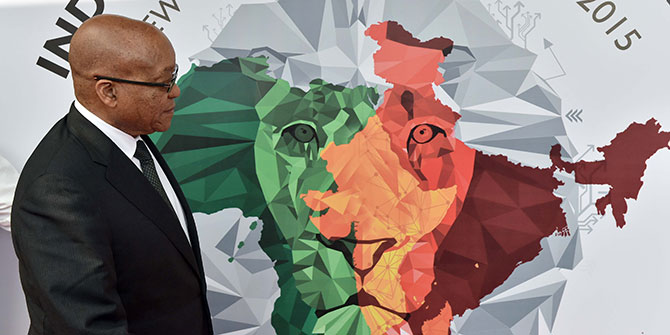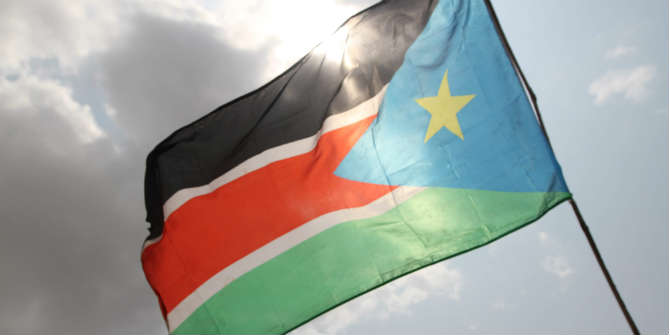LSE’s Jonathan Jackson and Oxford’s Ben Bradford look at how South Africa’s police force can shore up its legitimacy among its citizens. This post is based on the paper What price fairness when security is at stake? Police legitimacy in South Africa by Ben Bradford, Aziz Z Huq, Jonathan Jackson and Benjamin J Roberts, to be published at Regulation & Governance.
State institutions need legitimacy to function effectively and develop over time. This is as true for the police as it is for any other, but peculiar to the police function is the state-sponsored use of violence and force, the resolution of conflict, and the enforcement of legally-prescribed conduct and rule-following. Wrapped up as it is with issues of force, compliance and collective endeavour in dealing with crime and disorder, police legitimacy is fundamental to the wider legitimacy of the state.

But why do people believe that the police are legitimate? Studies – mostly conducted in the US, UK and Australia – find that perceptions of procedural justice are key drivers of public judgements concerning the legitimacy of the police. When police officers behave honestly and respectfully toward citizens, listen to what they have to say, make fair decisions, and act in ways that build trust, the latter will regard the authority of the former as legitimate, will defer to this authority, and will feel that police power is justified. Judgements about other aspects of police behaviour – notably, its effectiveness – are less important predictors of legitimacy among people living in “western” societies.
Yet, this procedural justice effect has received only sporadic testing in societies where social order is more tenuous, resources to sustain it scarcer, and where the position of the police is less secure. In order to explore these ideas in a new and fascinating context, we recently conducted a study into people’s attitudes toward the police in South Africa.
On what basis is the legitimacy of the police established and reproduced in this divided, unequal, violent and often fearful society? South Africa is characterised by the existence of numerous conflict groups. Many South Africans still do not have access to proper sanitation and decent housing; the maintenance and quality of pre-existing infrastructure and the affordability of services is an area of huge concern. Over-arching goals of human security are pursued under conditions of tight fiscal constraint and institutional instability and, notwithstanding the advent of democracy, the social position of the police in South Africa appears fragile and contested.
Our findings suggest that despite these issues procedural justice remains an important factor shaping people’s legitimacy judgements. However South Africans also stress the significance of crime and security concerns, as well as the perceived effectiveness of the police and the state, and they place far greater emphasis on these types of concerns than do their counterparts in the US or UK.
So why do South Africans place more emphasis on effectiveness and crime concerns when forming legitimacy judgements? One reason may be that the basic social utility of police is in doubt in South Africa. Post-apartheid attempts at legitimating the police were derailed by, among other things, rapid increases in recorded crime, and the large take-up of private security services and instances of vigilante action which serve to underline the question mark that seems to hang over the South African Police Service. Under such conditions people may draw more heavily on their assessments of the effectiveness when forming their legitimacy judgements (and when they perceive the public police to be ineffective they may turn to alternative security providers, further undermining its already fragile position).
Our results also suggest that police legitimacy in South Africa is not free-standing – independent of other institutions and their performance – but is rather tied to wider social processes and state legitimacy. There are clear links between appraisals of the government and police legitimacy, suggesting that the authority of the police is not grounded solely in citizen’s perceptions of its behaviour. When the government’s trustworthiness and performance is in doubt, police legitimacy may also suffer (the ability of other state actors to sanction and validate the police may be weakened when their own performance is in question).
The position of the police within broader societal structures, and its relationships with other state agencies, may have important implications for the extent of the legitimacy it is able to command. This is unlikely to be an issue only in South Africa. But the link between the police and other elements of the state may be particularly salient here given the history of apartheid and the current level of debate and contest about the performance of the state and its ability to provide, in a basic sense, for its citizens.
Overall, our study corresponds with other recent work[1] in suggesting that attempts to establish trust in, and the legitimacy of, the police in South Africa should focus on core aspects of policing: providing a basic, responsive service to citizens in that it is as effective as possible in dealing with their concerns while at the same time treating them with fairness, dignity and respect. Until these ‘basics’ are secured, more ambitious change programmes are likely to continue to fail.
Citation: Bradford, B., Huq A., Jackson, J. and Roberts, B. (in press). ‘What Price Fairness When Security is at Stake? Police Legitimacy in South Africa’, Regulation and Governance. (link to the SSRN pre-publication version of the paper).
[1] Steinberg, J. (2012) Establishing police authority and civilian compliance in post-apartheid Johannesburg: An argument from Egon Bittner. Policing and Society 22(4): 481-495.
Marks, M., and Wood, J. (2010) South African policing at a crossroads: The case for a ‘minimal’ and ‘minimalist’ public police. Theoretical Criminology 14(3): 311-329.





